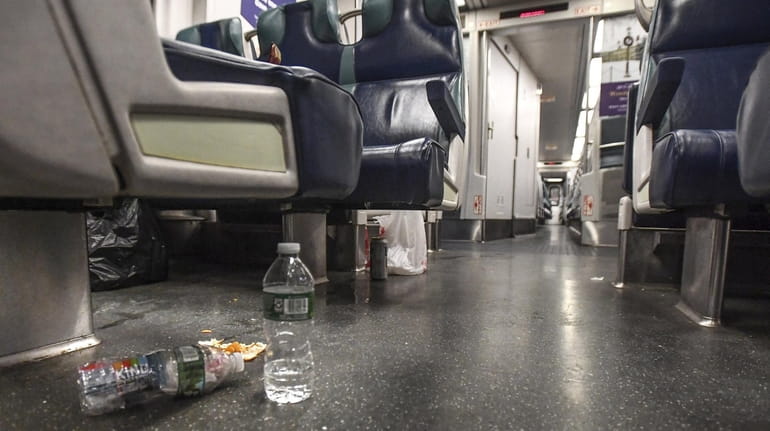To shame or not shame: That's the LIRR question on rider behavior

Litter on trains is an issue that keeps Long Island Rail Road commuters riled up on social media. Credit: Newsday/Thomas A. Ferrara
For as long as there has been a Long Island Rail Road, there have been railroad riders behaving badly — from seat-hoggers to nail-clippers to loud talkers.
But the explosion of social media in recent years has provided a new platform for exposing the faux pas of some of the LIRR's 300,000 daily customers. And some riders and experts are concerned the growing trend of “shaming” rude riders has gone too far.
Social media platforms, including Twitter, Facebook and Instagram, are becoming increasingly populated by embarrassing images and videos of passenger blunders — despite what the LIRR and its workers say are their best efforts to encourage good manners on trains. The images range from the egregious — riders stretched out and sleeping across three seats on a crowded rush-hour train — to the seemingly innocuous.
Twitter user Sara Williams, of Northport, last week shared photos of a passenger next to her chewing Altoids “like it’s popcorn” on her Huntington branch train.
Williams said the photos, which did not show the rider’s face, depicted "the larger problem of people continually forgetting that there are other people just inches away trying to get home or to work in peace."
"It's just one example of the slow death of common courtesy," said Williams, who also recently shared a photo of a rider who was "sniffling" too much. "Were they never taught manners? Or do they genuinely not realize that what they're doing can be bothersome to those around them?"
Williams' post was shared on the “Bad LIRR Riders” Twitter page — one of several social media accounts created in recent years dedicated to exposing embarrassing behavior on trains. The account’s banner photo above its logo features a female rider appearing to pick her nose.
Another Twitter account, @lirrmisfits, in its bio proclaims its mission of turning “rude passengers into superstars.” Among the videos and images recently shared on the account include a man biting his fingernails and spitting them at the seat across from him, a mother blocking an aisle with a child inside a stroller, and a man taking up “2 seats during rush hour and fake sleeping.”
In a statement, the @lirrmisfits account, which has nearly 500 followers, defended its content, noting that sharing images of people in a public space is legal and reasoning that “blatant rudeness and disregard for fellow commuters should be pointed out whenever possible.
“If rude people don't care about making others around them uncomfortable, they shouldn't care about getting attention for doing it. Look at 90 percent of the posts. They are of rude people doing obnoxious things in public for all to see."
But Sue Scheff, author of “Shame Nation: The Global Epidemic of Online Hate,” said the passive-aggressive “aim and shame” approach of dealing with inconsiderate behavior rarely accomplishes anything, and often serves only to humiliate people whose actions could be taken out of context.
Scheff referenced the viral video that surfaced in September of a man shaving in his seat onboard a NJ Transit train. After being widely ridiculed for his behavior, the man, Anthony Torres, explained to The Associated Press that he was homeless and trying to make himself look “presentable” before visiting his brother to seek help.
“Everyone is so quick to blame and slow to consider. What is the other side of somebody’s story? We don’t know,” said Scheff, who believes “there’s always a better way” than public humiliation to address inconsiderate behavior.
Deer Park commuter Stephanie Antoinette thinks many LIRR riders have become too sensitive and are “fishing for things to complain about.” She said she’s not bothered by riders putting on their makeup or eating takeout on the way home.
“What if that hour is the only time the woman has, between getting kids ready and dropping them off at day care? What if that hour is the only time that guy has to eat in between going from one job to another?" Antoinette said. “Posting pictures of them online to have other people ridicule them doesn’t serve any purpose other than putting negative energy into the environment.”
Michael Taub, founder and administrator of the “Long Island Fail Road” Facebook group, which has more than 3,400 members, said he has tried to balance commuters' frustrations with riders' privacy by enacting a policy that any photo shared of embarrassing behavior must obscure the perpetrator’s face.
Taub said he and other administrators also police the group for complaints that are “kind of ridiculous,” and sometimes opt to remove posts or disable commenting on them.
"We allow things up to a certain point," said Taub, of East Northport. "We've had instances where people in the group — it's them in the picture. And they weren't happy about it. But, for the most part, they understand, because they've done it themselves."
Taub, and other commuters, blamed some of the riders’ bad manners on the LIRR, noting conductors aren’t doing enough to curb behavior such as putting feet on seats or taking up space with luggage that could be stored on overhead racks.
“The conductors should really be taking care of it when they come around,” Taub said. “It really shouldn’t be on the ridership.”
One video that went viral last week of a NJ Transit rider refusing to move her bag off a seat on a crowded train captured a conductor confronting the woman and calling police to have her removed from the train.
Anthony Simon, general chairman of the Sheet Metal, Air, Rail and Transportation Union, which represents LIRR conductors, said that while train crews work closely with MTA Police in handling incidents, the responsibility of communicating policies for riding a train is that of management.
“Our train crews have the difficult task of requesting good behavior but are not able to enforce the behavior or apply consequences,” Simon said. “Confrontations can unfairly pose safety risks to our train crews.”
The Metropolitan Transportation Authority — the LIRR’s parent agency — said it does its part to rein in rude riders, including through its “Courtesy Counts” campaign, which features posters encouraging customers to “be someone who makes it a better ride.” The posters depict images of various onboard no-nos, and offer tips like, “Keep your feet off the seat” and “Groom at home.”
LIRR officials said they prioritize avoiding situations of conflict or tension, and are considering extra measures to encourage courteous behavior on trains, including announcements at station platforms. LIRR President Phillip Eng said he believes "the vast majority of our customers are very courteous."
"Our hats are off to all our customers who do the right thing every day by showing the world what New Yorkers are all about, showing consideration and making the ride better for everyone," Eng said. "Having said that, there is a small minority who act in disrespectful or dangerous ways, and that’s why we are reviewing past courtesy campaigns and other measures to ensure a safe and comfortable ride for all of our customers and employees on the train.”
Merrick commuter Brendan Donohue said he has felt the wrath of social media shaming — although he did so willingly. Having seen the “mean, abusive, dog-piling” and “mob mentality” that dominates LIRR social media forums, Donohue shared a photo on one commuter Facebook group of a shirtless man riding a train.
Among the dozens of people who commented on the post — including one accusing the shirtless passenger of carrying bedbugs — few realized the man in the photo was Donohue.
“They are all so reactionary on there,” Donohue, 24, said. “It made me feel like they were the ones being duped.”
10 ways LIRR riders behave badly
10. Phone chargers: Unless you’re seated right next to the outlet, that charging cable can become a dangerous tripwire.
9. Stinky diners: That Halal combo platter might smell delicious to you, but maybe not so much to everyone else.
8. The drunks: If you were sober, you’d realize how obnoxious you’re being, too.
7. Loud phone talkers: Nobody’s interested in whether you closed that deal or not.
6. The DJs: Some play their music so loud you can hear through their headphones. Others skip the headphones altogether.
5. The slobs: Just because there aren’t trash cans on a train doesn’t mean your garbage can go on the floor.
4. The sleepers (real and fake): Some lie down to catch some Z’s. Others pretend to be asleep so they won’t have to move their bags.
3. Aisle blockers: A particular problem on Hamptons-bound weekend trains, where luggage is almost as plentiful as riders.
2. Personal groomers: Keep the nail-clipping and hair-drying to your bathroom.
1. The seat hoggers: Your ticket bought a seat for you, not for your bag and your feet.
Source: LIRR riders
Tips for dealing with rude riders
Before you hit the record button on your iPhone, consider these suggestions offered by Sue Scheff, author of “Shame Nation: The Global Epidemic of Online Hate.”
1. Be better: One positive side effect of what Scheff calls the “aim and shame” phenomenon is that it’s spurred some people to be more courteous in public. “They’re more conscious to be nice to each other, because they don’t want to become a victim of social shaming,” Scheff said. “You have to learn that everything you do has a distinct possibility of being on camera.”
2. Make manners the law: This is more a tip for the LIRR: Make the rules for riding a train clear to passengers, including by posting them on trains. “Isn’t it sad that you have to put regulations for manners in life?” Scheff asked.
3. Have empathy: Before losing your cool over someone eating on a train, consider the possibility that “they are diabetic and need to eat,” Scheff said. “Everyone is so quick to blame and slow to consider: 'What is the other side of the story?' ”
4. Ask nicely: Scheff said all it takes oftentimes is a polite request to get someone to change his behavior. “You can confront them kindly, politely, and say, "Do you mind moving your bag?” Scheff said. “If you’re kind to them, nice to them, maybe they’re going to be OK and respect you . . . It’s all in how you ask.”
5. Don’t make matters worse: If a polite request is met with hostility, Scheff recommends “walking away,” rather than escalating a situation. “Because, let me tell you something," Scheff said, "there’s going to be someone behind you with another phone videotaping the whole thing.”

Updated now Newsday travel writer Scott Vogel took the ferry over to Block Island for a weekend of fun.

Updated now Newsday travel writer Scott Vogel took the ferry over to Block Island for a weekend of fun.

